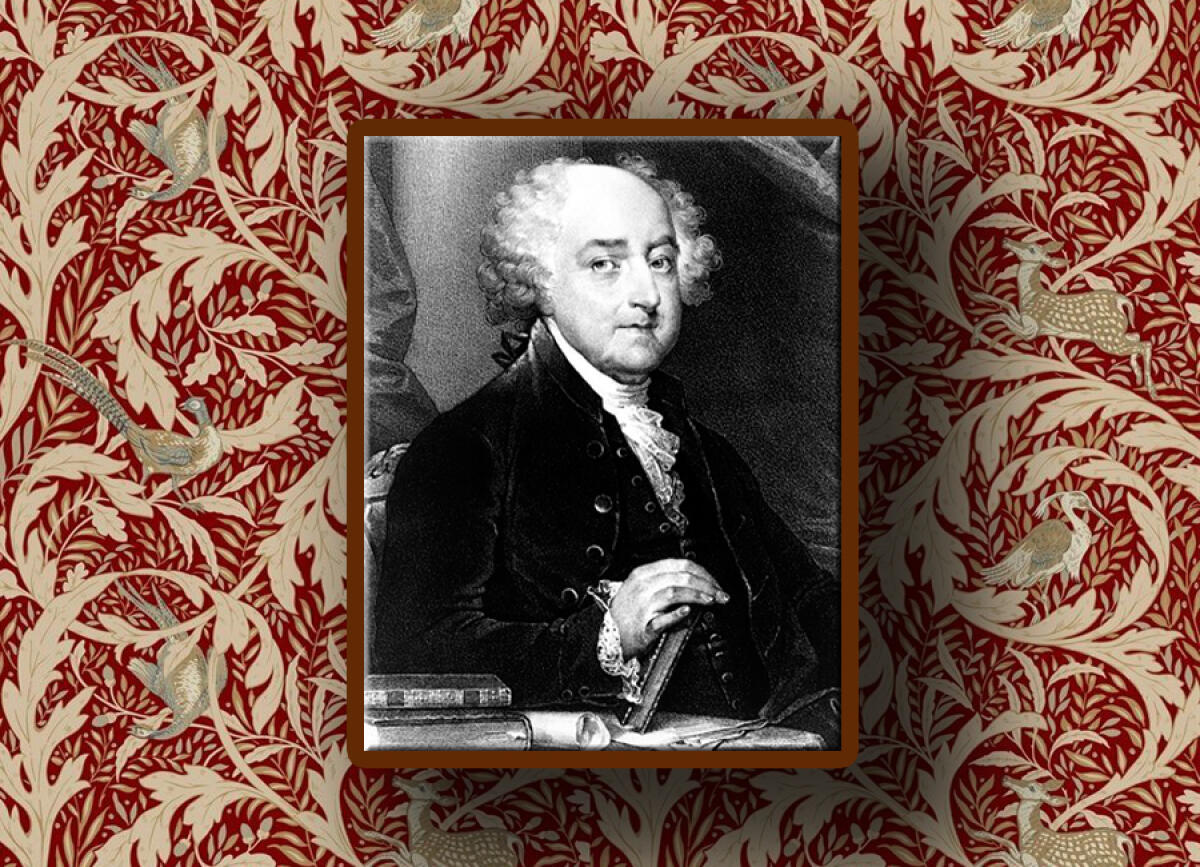- Saturday, 21 February 2026
- Have a HOT TIP? Call 704-276-6587 or E-mail us At LH@LincolnHerald.com
Notes Of Debates From The Continental Congress
Another article from the SAR and DAR leading up to America's 250th birthday in 2026.

Source: US Historical Archive (Gilbert Stuart - National Gallery of Art, Washington, D. C., online collection; Public Domain)
Within the National Archives, the diary of our future President John Adams is held. Reading his notes from 28 July 1774 provide great insight into the challenges facing the First Continental Congress and of the period as a whole. It contains excerpts from conversations and insight into the minds of our founding fathers at a time of great uncertainty…
Mr. Galloway. The Proposal I intended to make having been opposed, I have waited to hear a more effectual one. A general Non Importation from G. Britain and Ireland has been adopted, but I think this will be too gradual in its Operation for the Relief of Boston.
A General Non Exportation, I have ever looked on as an indigested Proposition. It is impossible America can exist, under a total Non Exportation. We in this Province should have tens of Thousands of People thrown upon the cold Hand of Charity.—Our Ships would lie by the Walls, our Seamen would be thrown out of Bread, our Shipwrights &c. out of Employ and it would affect the landed Interest. It would weaken us in another Struggle which I fear is too near.
To explain my Plan I must state a Number of facts relative to Great Britain, and relative to America.
I hope no facts which I shall state will be disagreable.
In the last War, America was in the greatest Danger of Destruction. This was held up by the Massa[chusetts] and by the Congress in 1754. They said We are disunited among ourselves. Their is no indifferent Arbiter between us.
Requisitions came over. A No. of the Colonies gave most extensively and liberally, other[s] gave nothing, or late. Pensylvania gave late, not for Want of Zeal or Loyalty, but owing to their Disputes, with Proprietors—their disunited State.
These Delinquencies were handed up to the Parent State, and these gave Occasion to the Stamp Act.
America with the greatest Reason and Justice complained of the Stamp Act.
Had they proposed some Plan of Policy—some Negociation but set afoot, it would have terminated in the most happy Harmony between the two Countries.
They repealed the Stamp Act, but they passed the declaratory Act.
Without some Supream Legislature, some common Arbiter, you are not, say they, part of the State.
I am as much a friend of Liberty [as] exists—and No Man shall go further, in Point of Fortune, or in Point of Blood, than the Man who now addresses you.
Burlamaqui, Grotius, Puffendorf, Hooker.—There must be an Union of Wills and Strength. Distinction between a State and a Multitude. A State is animated by one Soul.
As We are not within the Circle of the Supream Jurisdiction of the Parliament, We are independent States. The Law of Great Britain dont bind us in any Case whatever.
We want the Aid and Assistance and Protection of the Arm of our Mother Country. Protection And Allegiance are reciprocal Duties. Can We lay claim to the Money and Protection of G. Britain upon any Principles of Honour or Conscience? Can We wish to become Aliens to the Mother State.
We must come upon Terms with G. Britain.
Some Gentlemen are not for Negociation. I wish I could hear some Reason against it.
The Minister must be at 20, or 30 millions [expense]2 to inforce his Measures.
I propose this Proposition. The Plan.—2 Classes of Laws. 1. Laws of Internal Policy. 2. Laws in which more than one Colony were concerned, raising Money for War.—No one Act can be done, without the Assent of Great Britain.—No one without the Assent of America. A British American Legislature.
Mr. Duane. As I mean to second this Motion, I think myself bound to lay before the Congress my Reasons. N. York thought it necessary to have a Congress for the Relief of Boston and Mass.—and to do more, to lay a Plan for a lasting Accommodation with G. Britain.
Whatever may have been the Motive for departing from the first Plan of the Congress, I am unhappy that We have departed from it.— The Post Office Act was before the Year 1763.—Can we expect lasting Tranquility. I have given my full Assent to a Non Im and Exportation Agreement.
The Right of regulating Trade, from the local Circumstances of the Colonies, and their Disconnection with each other, cannot be exercised by the Colonies.
Mass, disputed the Navigation Act, because not represented, but made a Law of their own, to inforce that Act.
Virginia did the same nearly.
I think Justice requires that we should expressly ceed to Parliament the Right of regulating Trade.
In the Congress in 1754 which consisted of the greatest and best Men in the Colonies, this was considered as indispensable.
A civil War with America, would involve a national Bankruptcy.
Coll. Lee. How did We go on for 160 Years before the Year 1763? —We flourished and grew.
This Plan would make such Changes in the Legislatures of the Colonies that I could not agree to it, without consulting my Constituents.
Mr. Jay. I am led to adopt this Plan.
It is objected that this Plan will alter our Constitutions and therefore cannot be adopted without consulting Constituents.
Does this Plan give up any one Liberty?—or interfere with any one Right.
Mr. Henry. The original Constitution of the Colonies, was founded on the broadest and most generous Base.
The Regulation of Our Trade, was Compensation enough for all the Protection we ever experienced from her.
We shall liberate our Constituents from a corrupt House of Commons, but thro them into the Arms of an American Legislature that may be bribed by that Nation which avows in the Face of the World, that Bribery is a Part of her System of Government.
Before We are obliged to pay Taxes as they do, let us be as free as they. Let us have our Trade open with all the World.
We are not to consent by the Representatives of Representatives.
I am inclined to think the present Measures lead to War.
Mr. Ed. Rutledge. I came with an Idea of getting a Bill of Rights, and a Plan of permanent Relief.
I think the Plan may be freed from almost every objection. I think it almost a perfect Plan.
Mr. Galloway. In every Government, Patriarchal, Monarchical, Aristocratical or democratical, there must be a Supream Legislature.
I know of no American Constitution. A Virginia Constitution, a Pensylvanian Constitution We have. We are totally independent of each other.
Every Gentleman here thinks, that Parliament ought to have the Power over Trade, because Britain protects it and us.
Why then will we not declare it.
Because Parliament and Ministry is wicked, and corrupt and will take Advantage of such Declaration to tax us—and will also Reason from this Acknowledgment, to further Power over us.
Answer. We shall not be bound further than We acknowledge it.
Is it not necessary that the Trade of the Empire should be regulated by some Power or other? Can the Empire hold together, without it— No.—Who shall regulate it? Shall the Legislature of Nova Scotia, or Georgia, regulate it? Mass, or Virginia? Pensylvania or N. York. It cant be pretended. Our Legislative Powers extend no farther than the Limits of our Governments. Where then shall it be placed. There is a Necessity that an American Legislature should be set up, or else that We should give the Power to Parliament or King.
Protection.—Acquiescence. Mass. Virginia.
Advantages derived from our Commerce.
(Source: founders.archives.gov)

 Jennifer Baker, DAR Vesuvius Furnace
Jennifer Baker, DAR Vesuvius Furnace
















